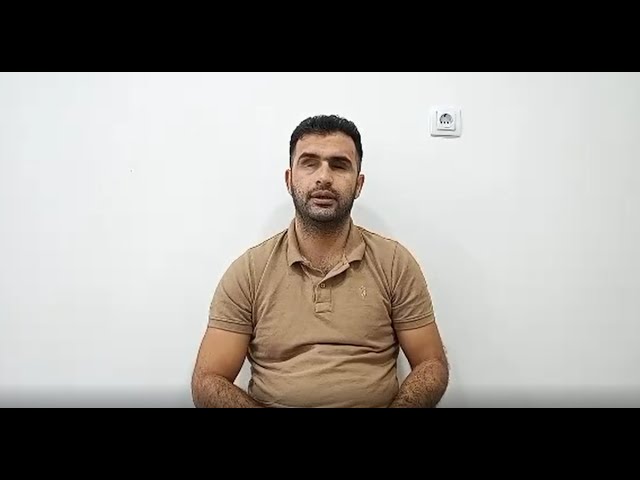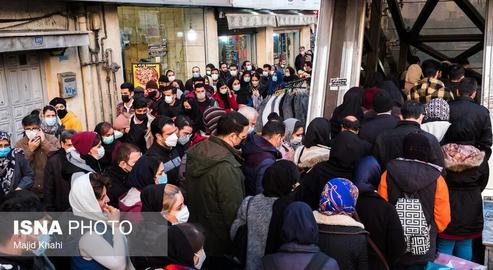Khaled Ahmadi Janshiran is a former kolbar: a border courier, carrying huge loads of goods on his back on the mountainous path from Iran to Iraq in a bid to stave off the worst of the poverty imposed on the inhabitants of Iran’s border provinces. Like scores of others before him he was shot at by border guards, and he ended up losing his sight.
On February 22, 2017, Khaled left for Iraq with five of his friends and fellow kolbars. They were on their way to the village of Delavaran when the Iranian Border Regiment opened fire on the group. A bullet passed through the left side of Khaled’s face, struck his left eye and exited through his right. In a split-second, his life and those of his family were changed forever.
Khaled is 31 years old and hails from the village of Dehgarji in the county of Oshnavieh, West Azerbaijan, where he still lives today with his wife and two children. He sat in front of the camera for IranWire and narrated his life, which he can no longer see. The day he was shot at, he said, he and his companions weren’t even carrying anything.
"I was running from the path, and the ground was covered with snow. I fell down, and tried to hide from the officers. Suddenly I felt as if a mine had exploded. I was shocked and alarmed. I touched my face, and then realized I couldn’t see anything. I touched my eye. That was when I realized it was torn. At that moment, I thought only of my children, and asked God to keep me alive so that I could return to my family."
With hands half-frozen from the snow, Khaled took out his mobile phone and punched blindly at the buttons, calling the first number on the contacts list. Without knowing who was on the other end of the line, he said, “I could only say that I was injured and wanted my family to be informed. I heard them answer that they didn’t have my family’s number. I told them all the information I had memorized. A few minutes later, my family called me and I told them that I had been shot in Piranshahr, and I needed help."
It took the search party three or four hours to find Khaled wounded on the ground. He was transferred to Oshnavieh Hospital, and after preliminary treatment and dressings on his eyes, he was taken to Urmia for specialist treatment: "My left eye socket was completely empty. From there, I went to Tehran with my family."
Khaled and his family desperately hoped that the vision in his right eye would be restored in the fulness of time. “I prayed to God that I’d be able to see my children and family again,” he said. “But my hopes turned to despair. The treatment process brought the sense of smell and touch back to parts of my face, but because I couldn’t afford it and do not have any insurance, I could not continue the surgery."
He has not been able to work since. Only donations from ordinary citizens have kept him and his family alive. Without help, he can barely get around town by himself. "My eyes are the other people,” he said, struggling to put the words together.
Naturally the family complained to the authorities. By law, the Border Regiment can not open fire without giving a warning first. But their legal case came to nothing: “Even after several years, no one has responded to us. I’ve been asked to go to the scene of the shooting several times – and to pay four million tomans to cover the experts each time. So far, I’ve paid more than 24 million tomans. I got this money at my children's expense. But I haven’t received any response so far. Is this justice? To whom should I talk about my pain?"
Khaled's story is just one of countless like it among the kolbars of Iran, a group abused and marginalized to the point of dehumanization in the eyes of the state. Those of Baloch fuel carriers elsewhere on Iran’s borders are often not dissimilar. Without recourse to the most basic civil rights, let alone justice, all they can do is keep telling them.
This article was written by a citizen journalist in Iran under a pseudonym.
Related coverage:
Kolbar Shot Dead in the Mountains of West Azerbaijan
Two Kolbars Hospitalized After Border Guards Open Fire
Four Iranian Kolbars Shot and Killed in a Fortnight
They Shoot Kolbars, Don't They?: An IranWire Film
Iranian "Kulbar" Workers Shot Without Warning by Border Guards
Women Kulbars: A Deadly Job in a Beautiful Landscape
Imprisoned Editor: Kolbars Signify the Collapse of Iran’s Economy
"Kolbars are the Result of Prejudice": Interview with Jamshid Bahrami
An Anthropologist's Take on the Kolbari Phenomenon
#Don’t_Kill_Kulbars Twitter Storm Takes Over Iranian Cyberspace
visit the accountability section
In this section of Iran Wire, you can contact the officials and launch your campaign for various problems


























comments